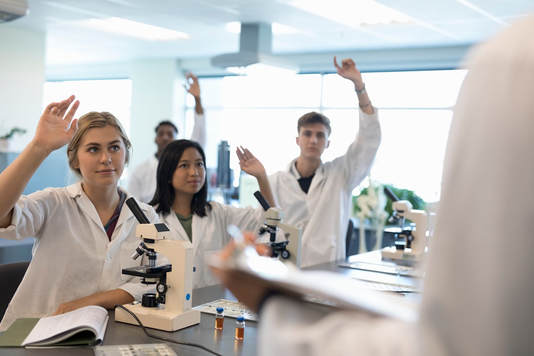|
Laboratory science professionals hold many types of degrees, from high school diplomas to doctorate-level degrees. Most employers require certification for laboratory professionals in clinical and anatomic pathology laboratories. Certification recognizes individuals who have met specific criteria predetermined by the certifying organization.
Learn about the American Society for Clinical Pathology Board of Certification → Use ASCP's Board of Certification's 'Examination Eligibility Assistant' to determine if eligible to sit for the examination apps.ascp.org/BOCROUTEFINDER Learn about American Medical Technologists → In the U.S., some states require licensure in addition to certification. Like certification, licensure recognizes individuals who meet specific standards but are typically more stringent than those established by the federal government. Unlike certification, it is illegal to work without a license in a state that requires it. |
|
Medical laboratory scientists and technicians must be licensed in the following states/territories:
|
Cytotechnologists must be licensed in the following states/territories:
|
Histotechnologists and histotechnicians must be licensed in the following states:
Alaska Florida Georgia Massachusetts Nevada West Virginia |
Education Pathways
There are many pathways that lead to a career in the laboratory sciences. There are pathways for high school students, students already enrolled in college, and individuals who have a college degree.
For careers where a bachelor’s degree is required, there are traditional 4-year programs, as well as “2+2” and “3+1” programs. In 2+2 programs, students complete 2 years of foundational prerequisite coursework followed by 2 years of coursework in their chosen laboratory science program. Similarly, in 3+1 programs, students complete 3 years of foundational prerequisite coursework followed by 1 year of coursework in their chosen laboratory science program.
For students who already have a college degree, there are 1- and 2-year master’s programs available, as well as 1-year hospital- and university-based undergraduate programs.
To find the right program for you, use the links below.
For careers where a bachelor’s degree is required, there are traditional 4-year programs, as well as “2+2” and “3+1” programs. In 2+2 programs, students complete 2 years of foundational prerequisite coursework followed by 2 years of coursework in their chosen laboratory science program. Similarly, in 3+1 programs, students complete 3 years of foundational prerequisite coursework followed by 1 year of coursework in their chosen laboratory science program.
For students who already have a college degree, there are 1- and 2-year master’s programs available, as well as 1-year hospital- and university-based undergraduate programs.
To find the right program for you, use the links below.
Find a Program
National Accrediting Agency for Clinical Laboratory Science (NAACLS)
NAACLS accredits programs for Phlebotomist, Medical Laboratory Assistant (Clinical Assistant), Medical Laboratory Technician, Medical Laboratory Scientist, Histotechnician, Histotechnologist, and Pathologists’ Assistant.
Find a program at NAACLS→
Commission on Accreditation of Allied Health Education Programs (CAAHEP)
CAAHEP accredits programs in Cytotechnology.
Find a program at CAAHEP→
Accrediting Bureau of Health Education Schools (ABHES)
ABHES accredits various health education programs.
Find a program at ABHES→
New York State Clinical Laboratory Association (NYSCLA)
Find a program in New York State
Doctorate in Clinical Laboratory Science (DCLS)
Find a program in the U.S.
NAACLS accredits programs for Phlebotomist, Medical Laboratory Assistant (Clinical Assistant), Medical Laboratory Technician, Medical Laboratory Scientist, Histotechnician, Histotechnologist, and Pathologists’ Assistant.
Find a program at NAACLS→
Commission on Accreditation of Allied Health Education Programs (CAAHEP)
CAAHEP accredits programs in Cytotechnology.
Find a program at CAAHEP→
Accrediting Bureau of Health Education Schools (ABHES)
ABHES accredits various health education programs.
Find a program at ABHES→
New York State Clinical Laboratory Association (NYSCLA)
Find a program in New York State
Doctorate in Clinical Laboratory Science (DCLS)
Find a program in the U.S.
Help make this site better and more useful by providing us with your valuable feedback!


